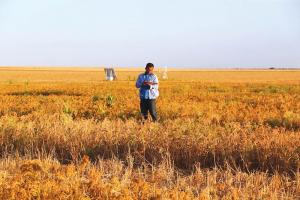2024 - Volume #48, Issue #4, Page #27
[ Sample Stories From This Issue | List of All Stories In This Issue | Print this story
| Read this issue]
New Millet Offers Higher Yields
 |
“Before we introduced our new varieties, most in use had been developed in the early 1990s,” says James Schnable, Dryland Genetics. “We introduced our first variety 3 years ago. It’s now on tens of thousands of acres.”
The new, high-yielding, non-GMO varieties are finding a home as an alternative to leaving the ground fallow between wheat crops. In other cases, wheat growers go to a wheat-fallow-millet rotation to harvest a crop two years out of three instead of two out of four.
Schnable sees even greater potential for proso millet as a profitable alternative crop in the Midwest. He suggests rotating it with winter annuals such as winter canola, camelina, or winter peas.
“With a short growing season of only 60 to 90 days, proso millet can be planted as late as the end of June, later than most would try to plant soybeans,” says Schnable. “It can be rotated with other small grains and legumes for more diversity in a cropping system while still obtaining high performance and profitable yields. Harvested before corn or soybeans, it spreads out the harvest season.”
Schnable, a genetics professor at the University of Nebraska, co-founded Dryland Genetics with his father, Patrick Schnabel, the director of the Plant Sciences Institute at Iowa State University. The two researchers focus on proso millet as a sustainable alternative to dryland corn and soybeans.
Schnable points out that proso millet already produces twice as much grain from a single gallon of water as corn, sorghum, and other grain crops. Unlike corn, it doesn’t require supplemental nitrogen, reducing production costs. It’s already grown on half a million acres in the U.S., mainly in Colorado and Nebraska.
“Proso millet has already overcome most barriers to a new crop,” says Schnable. “Farmers don’t have to be educated on how to produce or market it; they already have the equipment to plant and harvest it. It’s already water and nutrient-efficient. We just need to focus on producing more grain from each plant.”
Dryland Genetics also works to improve standability and reduce shattering. Along the way, another beneficial feature developed.
“The first two varieties we developed had thicker stalks than existing varieties,” says Schnable. “Farmers like the strong stems, as they capture more winter snow, preserving the moisture for the coming year.”
Contact: FARM SHOW Followup, Dryland Genetics, 2500 N. Loop Dr., Suite 7411, Building 7, Ames, Iowa 50010 (www.drylandgenetics.com).

Click here to download page story appeared in.

Click here to read entire issue
To read the rest of this story, download this issue below or click here to register with your account number.




